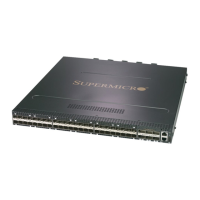Supermicro SSE-F3548S/SSE-F3548SR Configuration User’s Guide
The “no spanning-tree transmit hold-count” command resets the hold count to the default
value of 3.
The example below shows how to configure the transmit hold count value.
Configure the transmit hold count as 8.
SMIS# configure terminal
SMIS(config)# spanning-tree transmit hold-count 8
SMIS(config)# end
6.18 Root Guard
In spanning tree networks, the position of the root switch is important to achieve optimized topology.
According to spanning tree protocol, any switch can become a root switch based on the priority and
switch MAC address. Networks managed by multiple administrators can lead to multiple switches with a
lowest priority to compete for root switch status. There is no option to block any switch becoming the
root switch to maintain the optimized topology.
The root guard feature helps prevent any unexpected switch from becoming the root switch. If the root
guard feature is enabled on a port, it prevents any switches connected to that port from becoming the
root switch. If any superior BPDU is received on the root guard enabled port, the switch moves that port
from a forwarding state to a listening state.
The root guard feature is disabled on all ports by default.
Follow the steps below to enable the root guard feature on the ports.
Enters the configuration mode
interface <interface-type><interface-id>
or
interface range <interface-type><interface-id> ….
Enters the port interface mode.
interface-type – may be any of the
following:
fx-ethernet – fx
cx-ethernet – cx
port-channel – po
interface-id is in slot/port format for all
physical interfaces. It may be the port
channel identifier for port channel
interfaces.

